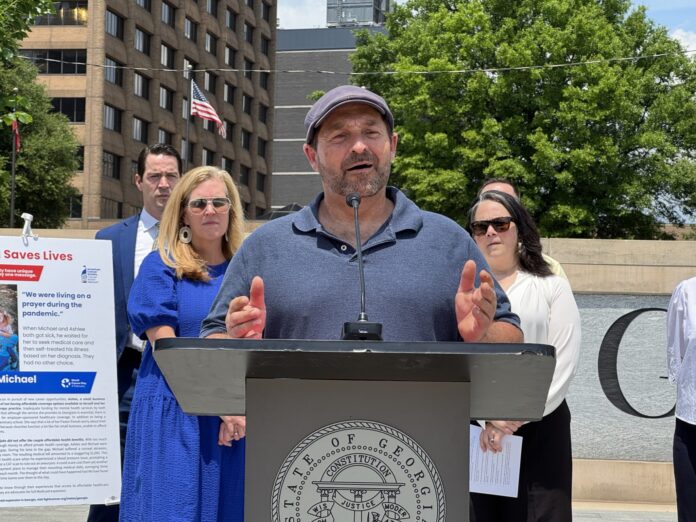
(Georgia Recorder) — Advocates are bracing for potential cuts to Georgia’s safety net programs under the GOP’s “big, beautiful bill” moving through Congress, though it remains to be seen what changes to programs like Medicaid will end up in the final version.
As is, the federal measure would cut more than $600 billion over the next decade from Medicaid, the government health insurance program for low-income Americans and people with disabilities. The savings would go toward extending President Donald Trump’s 2017 tax cuts.
The U.S. House of Representatives could vote on the bill this week, though as of late Tuesday Republicans had not yet rallied behind the current version.
Even though the bill appears to be designed to chip away at Medicaid’s expansion under the Affordable Care Act, advocates and others say states like Georgia that did not fully expand Medicaid could still feel the effects of the cuts.
In Georgia, the program covers about 2.2 million people, mostly providing health care coverage and services for children, older Georgians and people with disabilities. In recent years, the program was slightly expanded to include adults who complete 80 hours of work, job training, education or community service every month.
D’Arcy Robb, executive director of the Georgia Council on Developmental Disabilities, said Tuesday that she is not worried about funding for Medicaid-funded services that are considered mandatory, like for care in a nursing home.
But Robb said she is concerned about Medicaid services that are considered optional, such as funding for home and community based services that are designed to keep people with disabilities out of nursing homes. There are already about 8,000 people in Georgia waiting to receive those services, with state lawmakers funding 150 new waivers this year.
“We can’t afford to lose any money. We’re already scraping the bone, and we’re already seeing families that are going to extreme means to support their loved ones,” Robb said.
These waiver programs took a hit during the Great Recession, with Georgia joining all other states in scaling back services to help balance their budgets. Robb is fearing a repeat if a big cut to Medicaid makes it into the final bill.
“I’m not trying to imply that states are going to cut services to people with developmental disabilities because they want to. I don’t think anybody wants that,” Robb said.
“But the reality is the states have to balance their budgets, and history has shown us that when Medicaid takes a big cut on the national level, states have to cut somewhere. One of the places they can cut is waivers,” she said.
As proposed, the bill also includes provisions that would hurt children who are covered by Medicaid, says Callan Wells, senior health policy manager with GEEARS: Georgia Early Education Alliance for Ready Students. About 42% of Georgia children are enrolled in Medicaid.
One proposed change in the bill that has flown under the radar would scale back “retroactive coverage” from three months to one, Wells said.
“This could lead to significant medical debt, especially for families of children with disabilities,” she said. “These children often receive costly care for months before their families learn about and apply for Medicaid. Without full retroactive coverage, families may be left responsible for those early expenses. For many, this coverage is a crucial financial safeguard.”
‘I want to work’
The proposed cuts come at a time when some Georgia GOP leaders had begun to soften their staunch resistance to full Medicaid expansion, though a measure floated this year that had support from a few rural Republicans quickly fizzled.
Natalie Crawford, executive director of Georgia First, a bipartisan advocacy group, urged congressional leaders to rethink sweeping changes that would reduce federal investment in Medicaid.
Georgia First held a press conference this week with the American Cancer Society Cancer Action Network to push back against the bill’s reductions to Medicaid spending.
“These proposals could limit access to care and roll back the progress we’ve made in reducing cancer disparities,” said Fabienne Antoine-Nasser, the society’s Georgia government relations director.
Crawford said the bill would also likely worsen the state’s already high uninsured rate. Georgia is tied with Oklahoma for the second highest uninsured rate in the country.
“Fueling the momentum behind such reforms is a trap of divisive rhetoric, misinformation and fear mongering that clouds the understanding of what this program is really delivering for states and who is really benefiting from the safety net,” Crawford said.
“Despite what influential voices may try to convince you is true, Medicaid is not covering mostly able-bodied men who don’t want to work,” she said.
Instead, Crawford said the program should be there to help people like Alton Fry, a Franklin County stone mason who was diagnosed with prostate cancer last year. Fry is caught in what is known as the coverage gap, meaning he makes too much for Medicaid but too little to afford private health insurance.
Fry said he racked up about $37,000 in medical debt in just about half a year before he started receiving donations through a GoFundMe page. He said he is undergoing radiation treatment, which he says is not the most effective treatment for him but it is more affordable than surgery.
“I want to work. I don’t want to live off the government,” Fry said. “All I’m asking for is temporary help to get me over this hump in life, and it wasn’t there, and it’s not there.”
The GOP measure would impose a work requirement on Medicaid recipients starting in 2029. The 90% federal match for states that expand Medicaid, though, would remain intact.
Some far-right Republicans, including Georgia Congressman Andrew Clyde of Athens, are pushing for deeper cuts to Medicaid.
Georgia Congressman Buddy Carter, a Pooler Republican, recently defended the proposed changes to Medicaid while on the Atlanta Journal-Constitution’s Politically Georgia podcast. Carter argued the proposals would help stabilize the program for the most vulnerable.
“You shouldn’t have an able-bodied person who could be doing some type of work – it even includes volunteer work – that is on that program,” said Carter, who is a U.S. Senate candidate. “That’s not who it was intended for, and that’s not who we should be using it for. So, there are all kinds of things that we can do to find savings without kicking anyone off.”







